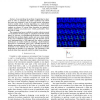Free Online Productivity Tools
i2Speak
i2Symbol
i2OCR
iTex2Img
iWeb2Print
iWeb2Shot
i2Type
iPdf2Split
iPdf2Merge
i2Bopomofo
i2Arabic
i2Style
i2Image
i2PDF
iLatex2Rtf
Sci2ools
ICRA
2009
IEEE
2009
IEEE
Real-time correlative scan matching
— Scan matching, the problem of registering two laser scans in order to determine the relative positions from which the scans were obtained, is one of the most heavily relied-upon tools for mobile robots. Current algorithms, in a trade-off for computational performance, employ heuristics in order to quickly compute an answer. Of course, these heuristics are imperfect: existing methods can produce poor results, particularly when the prior is weak. The computational power available to modern robots warrants a re-examination of these quality vs. complexity trade-offs. In this paper, we advocate a probabilistically-motivated scan-matching algorithm that produces higher quality and more robust results at the cost of additional computation time. We describe several novel implementations of this approach that achieve real-time performance on modern hardware, including a multi-resolution approach for conventional CPUs, and a parallel approach for graphics processing units (GPUs). We also pro...
Employ Heuristics | ICRA 2009 | Probabilistically-motivated Scan-matching Algorithm | Robotics | Scans |
Related Content
| Added | 23 May 2010 |
| Updated | 23 May 2010 |
| Type | Conference |
| Year | 2009 |
| Where | ICRA |
| Authors | Edwin B. Olson |
Comments (0)

